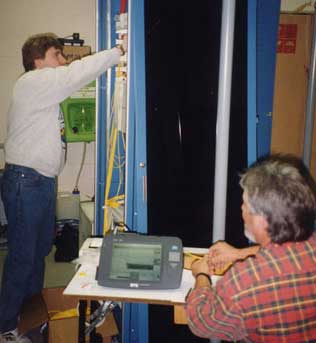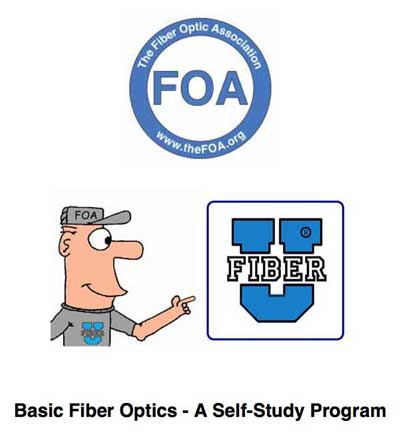Lesson 8: Fiber Optic
Testing

Objectives: From this lesson you
should learn:
What parameters need to be tested
What instruments are used for fiber optic testing
How to perform basic fiber optic testing
Measurement uncertainty in fiber optic testing
How to troubleshoot problems
Fiber Optic Tests
This lesson, another extensive one, is on fiber optic
testing. Testing is the most complex part of fiber optics
but one of the most important.
After all fiber optic cables are installed, spliced and
terminated, they must be tested. For every fiber optic
cable plant, you need to test for continuity and polarity,
end-to-end insertion loss and then troubleshoot any
problems on every fiber in every cable. If itís a long
outside plant cable with intermediate splices, you will
probably want to verify the individual splices with an
OTDR test also, since thatís the only way to ensure that
each splice is good. If you are the network user, you may
also be interested in testing transmitter and receiver
power, as power is the measurement that tells you whether
the system is operating properly.
Testing involves visual inspection of terminations with a
microscope, tracing fibers visually and finding faults,
measuring optical power and loss with power meters and
light sources and sometimes specialized testing with OTDRs
and testers for special issues in long distance links.
With this lesson, it's important to learn what needs
testing and why, what are the potential errors involved in
the tests and where certain tests are appropriate. For
example, all installed cable plants require insertion loss
testing but some may also need OTDR tests, but OTDR tests
are generally not appropriate for short cables and always
require a knowledgeable operator to interpret traces -
they are not "push button" testers!
Testing
gives you data - in this case the loss of the fiber in a
cable plant. But does that test data tell you the cable
plant loss is good (low enough) or bad (loss is too
high)? You need to know that to pass or fail any fiber
being tested. The way you estimate the loss of the cable
plant is to calculate a "loss budget" for the fibers in
a cable plant. Generally the loss budget is done during
the design phase of a project and the data used to
validate the design for use with communications
equipment. But that same data should be used by the
installer/tester to compare to test results and make the
pass/fail judgement.
The
course leads you to read online or printed materials
(with an emphasis on the online using the FOA Guide),
watch FOA YouTube Videos, complete some activities and
take the quizzes. Each lesson plan will be
self-contained. Lesson plans open in new pages so the
course overview page stays open to lead you to the next
lesson or you may use the link at the bottom of the
page.
The
corresponding lesson in the Fiber U Basic Skills Lab
which shows you how typical installation processes
are done is also linked below.
Student Assignment:
Watch the videos, read the references and take the quizzes
(Test Your Comprehension)
FOA YouTube Videos:
Required:
FOA
Lecture 12: Fiber Optic Testing Overview
FOA
Lecture 15: Five Ways To Test Fiber Optic Cable Plants
FOA
Lecture 17: OTDR Testing
FOA
Lecture 26: Loss Budgets
Optional - Reccommended:
FOA
Lecture 13: Testing Fiber Visually
FOA
Lecture 14: Testing Optical Power
FOA
Lecture 16: Insertion Loss Testing
FOA
Lecture 18: OTDR Setup
FOA
Lecture 19: OTDR Measurement Uncertainty
FOA
Lecture 20: Other Fiber Optic Tests
FOA
Lecture 21: Visual Fault Locator Demonstration
Online FOA Reference:
Required:
Fiber
Optic Testing
Fiber
Optic Test Instruments
5
different Ways To Test Fiber Optic Cables According To
International Standards
OTDR
testing, Reading
An OTDR Trace
FOA
Standards, FOA1 to FOA-4
What
Loss Should You Expect?, Loss
and Power Budgets
Optional - Reccommended:
Visual
tracing & fault location
Microscope
Inspection of Connectors
Measuring
Optical Power, Units of Measure (dB, dBm)
Installed
Cable Plant Testing (OFSTP-14) Virtual
Hands-On: Insertion
loss testing, What
Loss Should You Expect?
Patchcord
or Single Cable Testing (FOTP-171)
Data
Link or Network Testing
OTDR
testing Virtual Hands-On: Using
an OTDR
Differences
in OTDR and insertion loss measurements
Book Chapter:
Optional - Extra Credit Reading
The
fiber optic tester in your pocket
Reference
Cables
Special
Applications/Hybrid Cables
Mismatched
Multimode Fiber Losses
Testing
cables with different types of connectors.
Loss
by Cable Substitution - when other methods will not
work
Connector
and Splice Loss Testing (FOTP-34)
Testing
long haul networks (CD, PMD, Spectral Attenuation)
FAQs
on Fiber Optic Testing
Optional -
Hands-On YouTube Videos
The
Fiber Optic Tester In Your Pocket (Using An Old Cell
Phone To See Infrared Light)
Insertion
Loss Testing
Optional
- Basic Skills Lab (do-it-yourself
"hands-on" labs)
Test Your
Knowledge:
Next: Lesson 9:
Fiber Optic Network Design
Return
to Lesson Plan
|

